It takes a dash of courage, a dollop of creativity, and a drizzle of good humor to overturn silly and nonsensical workplace policies. At the end of the day, some work rules just don’t make sense; and how inflexible some of your colleagues might be to making a logical exception can really make you raise an eyebrow. Luckily, there’s usually at least one person willing to fight for what’s right and amuse the entire internet at the same time. In this case, it’s redditor u/brother_p.
The man went viral after sharing an old work story with the legendary r/MaliciousCompliance crowd about how corporate tried to get him to pay 10 cents for a call charge from the company’s flip phone while he was away on business. This was roughly 16 to 17 years ago, in the ancient era before unlimited calling plans were a thing, so it’s no wonder that there were some fussy rules attached to phone use.
The first call was free while traveling. However, things took a peculiar turn when the OP had to make two calls during his business trip: one to the home office and one to his family. Corporate demanded that he pay up for the additional call. And u/brother_p found the perfect way to do that and change the policy at the same time. Scroll down for the hilarious story, dear Pandas.
Let us know what you think in the comments, and if you’d like to be all nostalgic about flip phones and special ringtones, feel free to do so (though additional roaming charges may apply).
In the ancient era of ~2005, unlimited calling plans weren’t really a thing yet, so companies had strict rules in place

Image credits: Ivan Radic (not the actual photo)
One man shared a hilarious story about what he did when corporate wanted him to pay 10 cents for using the company phone while away on business
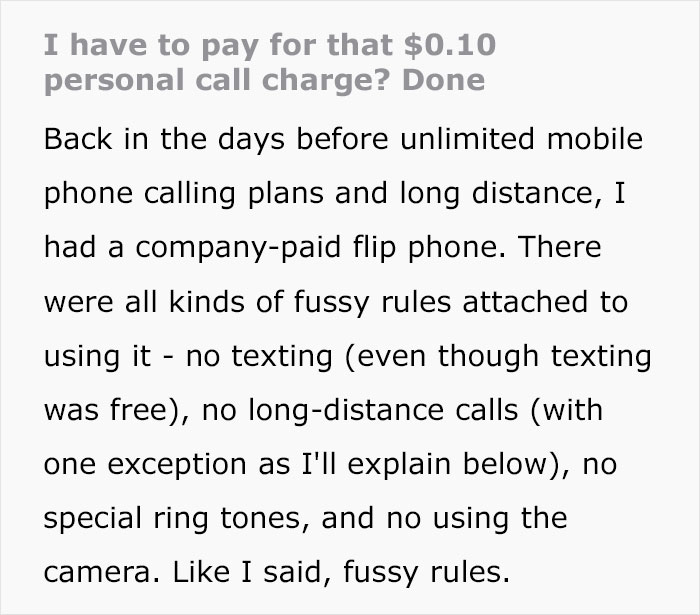
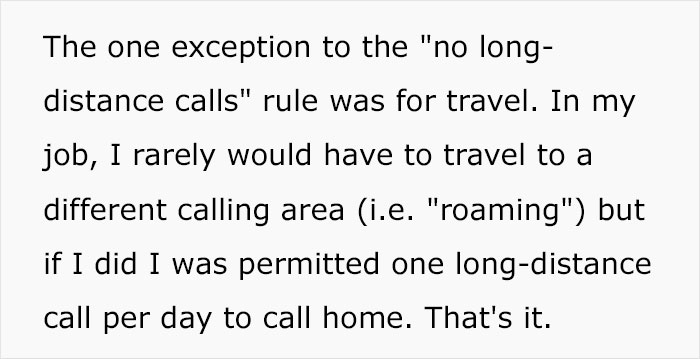

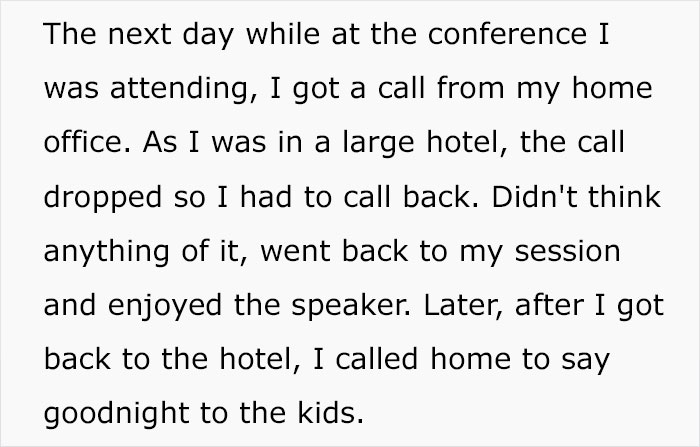

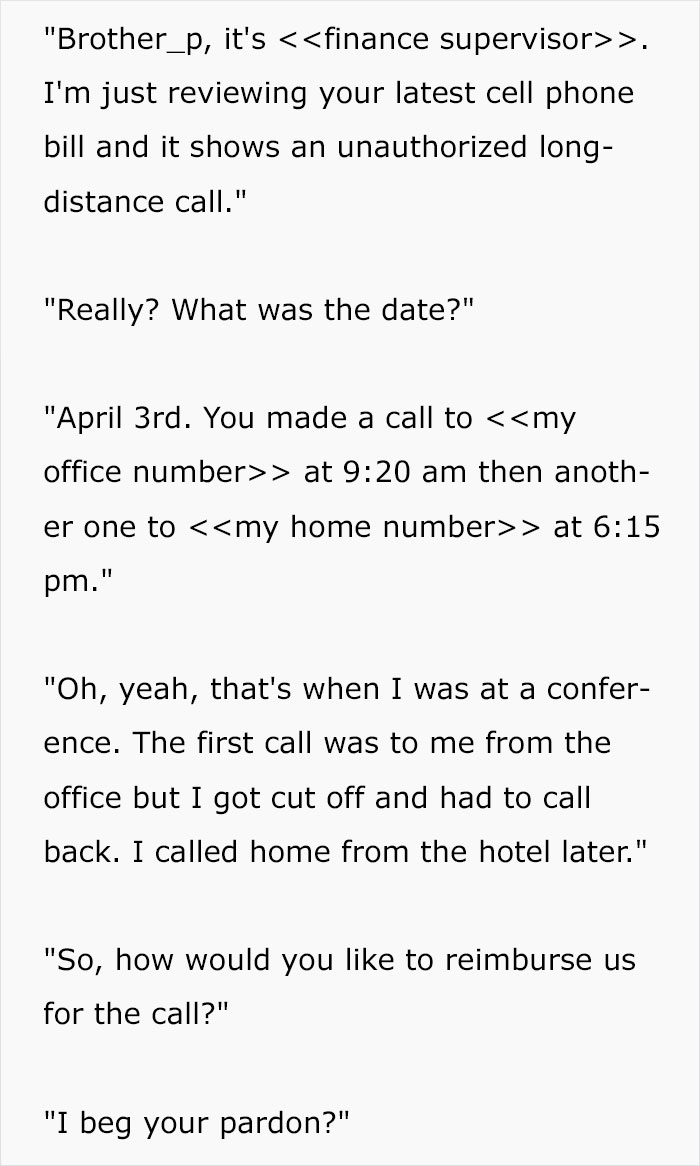
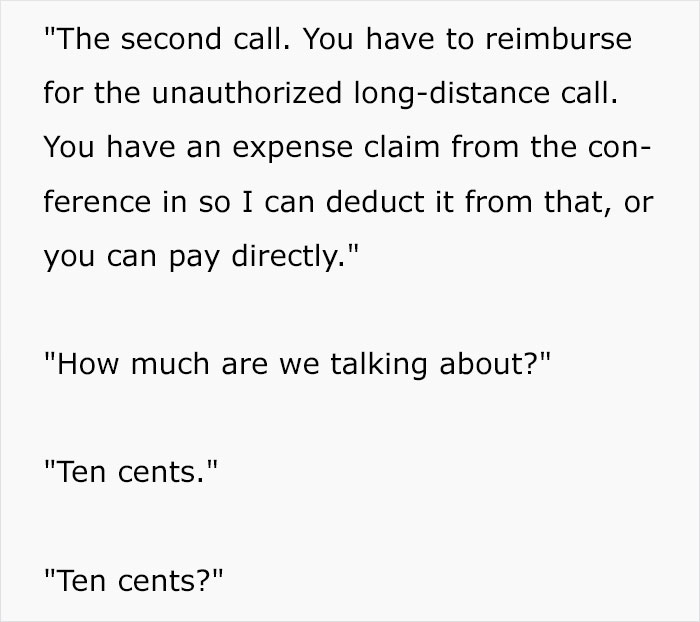


Image credits: Mick C (not the actual photo)
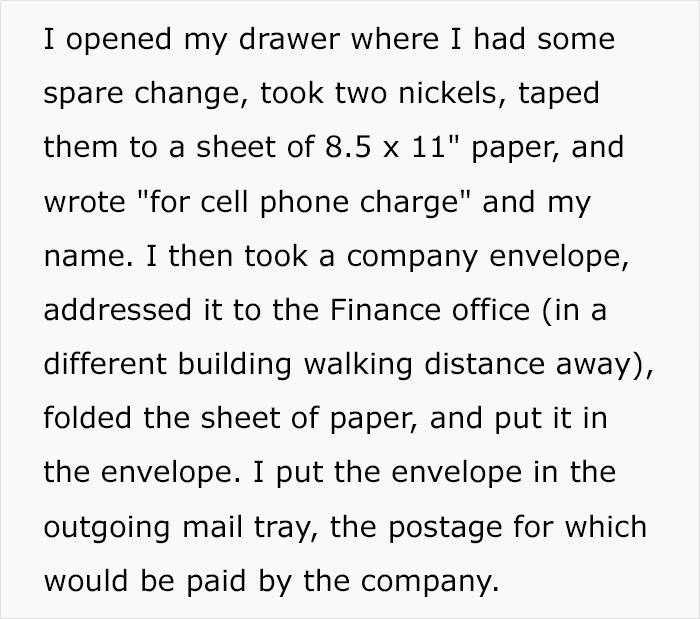

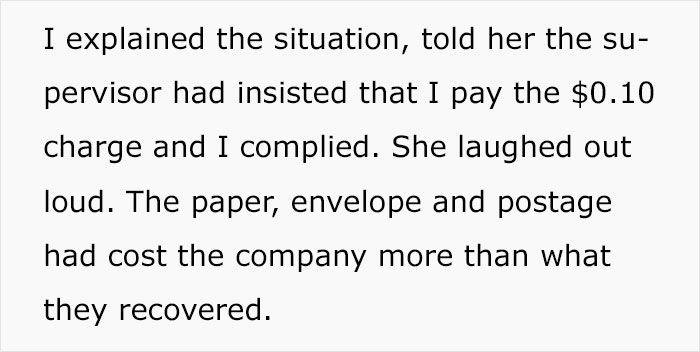

After being stunned that he had to pay 10 cents for having said ‘goodnight’ to his family while away for work, the redditor thought this was the perfect moment to teach corporate a lesson. He made sure that the company would have to pay far more for processing the entire fee by sending in the spare change via letter.
Lo and behold, a shark from way up in the corporate food chain came over to have a chat about the nickels. He explained the entire situation to the comptroller, made her laugh, and the finance department updated their cellphone policy to make it more friendly to the employees. We call that a definite all-around win. Who says everyone can’t be a winner on r/MaliciousCompliance sometimes?
Redditor u/brother_p shared with Newsweek that the situation took place around 2005 or 2006. “The district issued and paid for the phones and everyone generally understood and lived by the restrictions. The problem was, as in this instance, it was absurdly rigid and unable to adapt to exceptional cases like mine,” he explained.
“She [the comptroller] successfully initiated the policy and procedure change as she realized the costs involved in recovering small amounts were tens to hundreds of times higher. Now we just get a monthly allowance for our smartphones,” the OP told Newsweek how the policy has changed for the better.
It might seem weird that people had to pay so much for calls (especially long-distance) back in the day. Or that using mobile internet was as expensive as it was. However, that’s simply how things used to be. A while back, Bored Panda spoke about changes in technology and the future of tech with a couple of experts.
Aaron Genest, an expert on labor in the tech and innovation industry at Siemens, explained to us that we can more or less see what the future holds by looking upstream in the investment space.
“I’d argue that most people underestimate the timelines necessary to produce the technological goods on which we rely and the investment made to allow them to exist. For instance, it takes almost two years to develop and produce a computer chip and get it to market for a phone, and five years to get something into a new kind of car. So if we want to have a sense for what, for instance, the gadgets in our cars will look like in 2026, we just need to look at what the car manufacturers are asking their suppliers to design today,” he shared with Bored Panda that certain types of tech will probably be around until companies make good on their investments.
Here’s how the internet reacted to the epic post. Some folks even shared similar stories about having to deal with inflexible rules at work



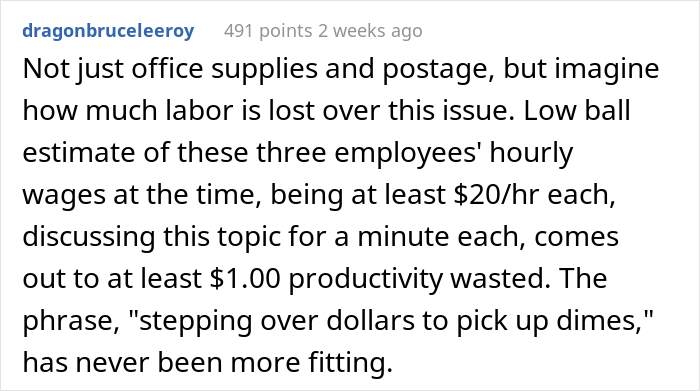
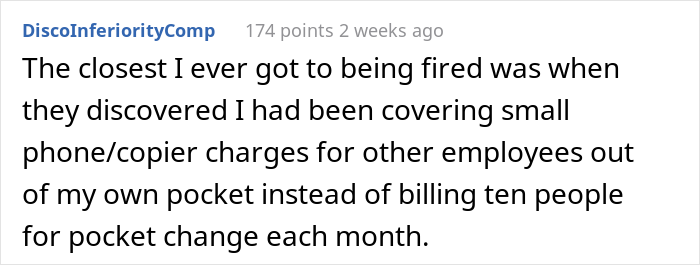


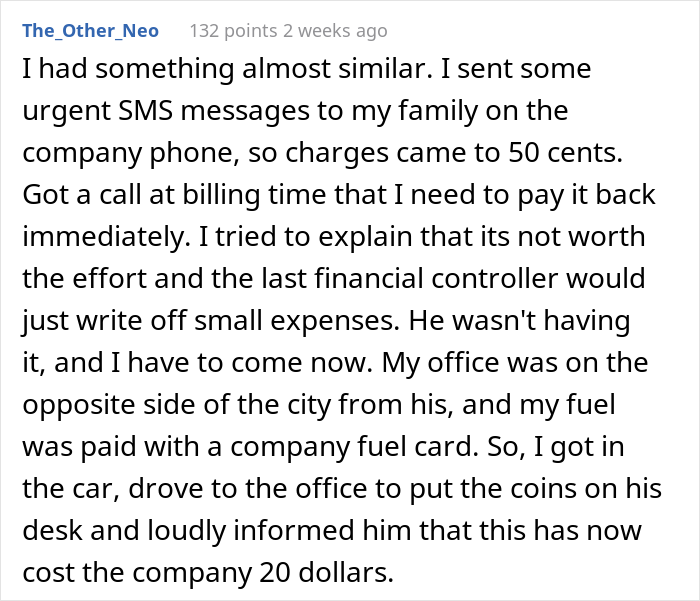


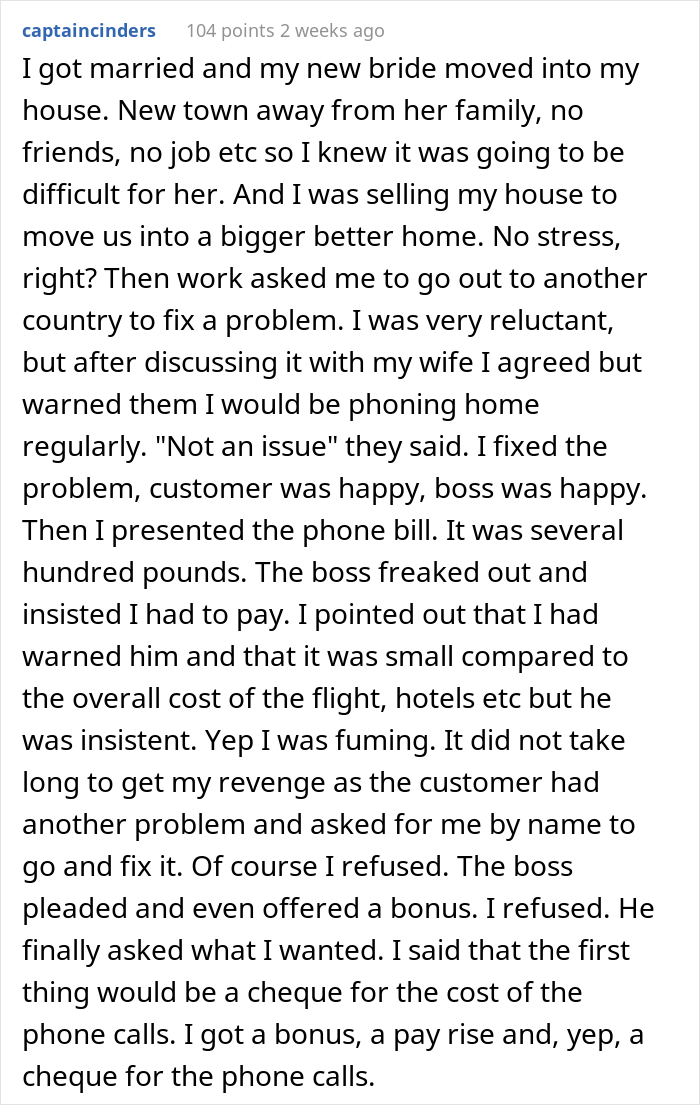


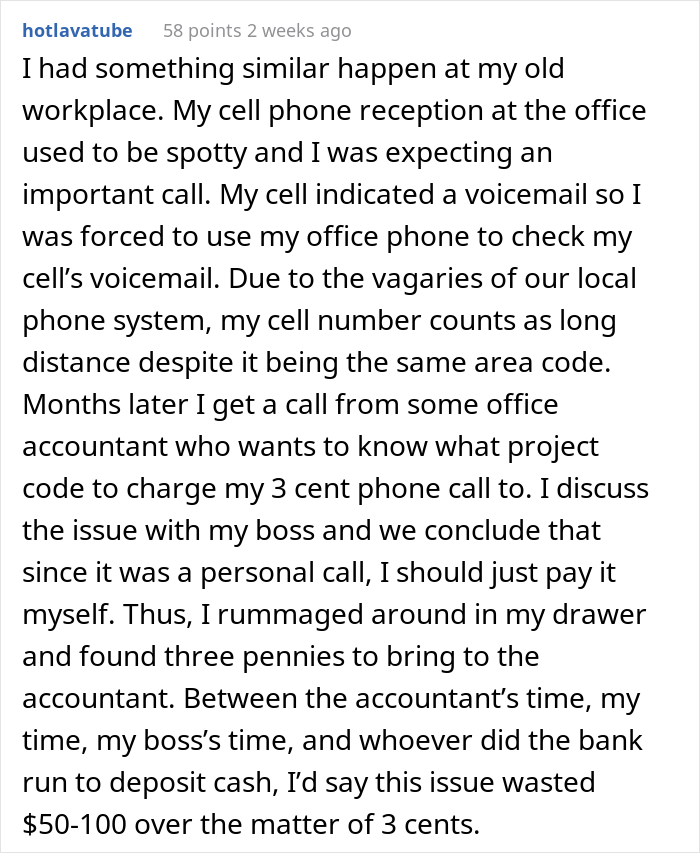

Meanwhile, Ramona Pringle, the Director of the Creative Innovation Studio and Associate Professor at the RTA School of Media at Ryerson University, stressed that anyone who says that they know for certain what the future holds is selling snake oil. We can never be 100% certain about anything. However, there are certain trends like the need to entertain and connect people that should hold true no matter how far into the future we go. (So some sort of version of phones is likely to be around in 50 or even 100 years’ time.)
“There are certain things we can count on: we love stories, and we love to be part of something bigger than ourselves. Be it oral storytelling, books, blogs, movies, or video games, we’ve never lost our love of narrative,” she told Bored Panda earlier.
“Equally true, even when we can’t go into a concert hall or colosseum, we look for ways to be together, connected, and part of a communal experience. The tech might change, but these will continue to be the drivers of our entertainment experiences,” the expert said.
“Immersion and interactivity have long been goals for creators and media makers when it comes to how technology can influence entertainment. For the last decade, we’ve leaned into virtual reality because of how it enables both of these. We can step inside a world and have influence over it, and the story or experience that unfolds. I think one of the things we can expect moving forward is, in a sense, the opposite of virtual reality. Instead, more of an enhanced reality or fictional reality, wherein the entertainment isn’t in a headset, but instead, all around us,” the expert mused about the near future.
“A decade ago, we didn’t talk to robots. Today, many of us do. Siri and Alexa are some of the more common bots, but we already interface with non-human characters regularly. As technology advances, including augmented reality and mixed reality, I think we can expect that entertainment will be something we can engage with off of the screen, but out in the world, with characters and stories we can engage with throughout the day, or throughout our houses,”
She noted that the desire to have shared experiences is likely to drive future tech, as creators find new and creative ways for people to be together even when they’re apart.
“I think we can expect to see entertainment that helps us connect, be it online or off, and immerses us in an experience, story, or community.”
The post "I Have To Pay For That %post_link%.10 Personal Call Charge? Done": Person Maliciously Complies By Mailing 10 Cents To Corporate first appeared on Bored Panda.
from Bored Panda https://bit.ly/3aCL0q5
via Boredpanda